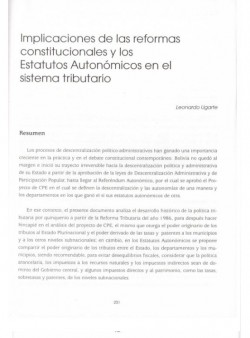Implications of constitutional reforms and Autonomous Statutes on the tax system
DOI:
https://doi.org/10.35319/lajed.200810180Keywords:
Decentralization, Tax policyAbstract
The processes of political-administrative decentralization have gained increasing importance in contemporary constitutional practice and debate. Bolivia was not on the sidelines and began its irreversible journey towards the political and administrative decentralization of its State from the approval of the laws of Administrative Decentralization and Popular Participation, until reaching the Autonomic Referendum, by which the CPE Project was approved in which decentralization and autonomies are defined in one way and the departments in which the autonomy statutes of another won. In this context, this document analyzes the historical development of the tax policy for five years from the Tax Reform of 1986, and then emphasizes the analysis of the CPE project, which grants the original power of taxes to the Plurinational State and the power derived from fees and patents to municipalities and other subnational levels; On the other hand, in the Autonomous Statutes, it is proposed to share the original power of taxes between the State, the departments and the municipalities, and it is advisable, in order to avoid fiscal imbalances, to consider that the tariff policy, taxes on natural resources and indirect taxes they are the domain of the central government, and some direct taxes and patrimony, such as taxes, surtaxes and patents, of the subnational levels.
Downloads






